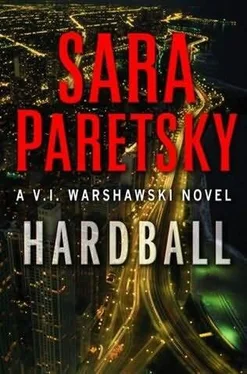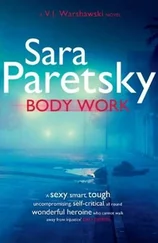“We have to find out about you on the news. You don’t have the common decency to call and say, ‘Oh, by the way, I’m going to meet all the bigwigs on earth,’ let alone invite me and your grandsons to go with you. Your own flesh and blood, and you show up on TV with that so-called detective.”
My cousin Petra suddenly appeared in the scene, dancing up the sidewalk, in stovepipe jeans and her high-heeled boots, clutching a sheaf of newspapers. The dogs ran to greet her, barks turning to squeaks of pleasure.
“Uncle Sal!” Petra’s husky voice drowned out Ruthie’s nasal whine. “Uncle Sal, just look! Wasn’t that a fabulous party? Weren’t we all incredibly brilliant? And you are a star, Uncle Sal. Did you see the Herald-Star? And the Washington Post used the same photo.”
I ran to the bathroom and stood under a cold-water shower for a minute. I hadn’t bothered with the papers on my blear-eyed way to and from the Loop this morning, but I’d tucked my copy of the Star into my briefcase. I looked at it now.
There Mr. Contreras was with Brian Krumas, on the front page of the ChicagoLand section. Krumas, a lock of hair falling over his forehead à la Bobby Kennedy, had one hand on Mr. Contreras’s shoulder, the other clutching Mr. Contreras’s arm just behind the elbow, so that the camera’s focus was on my neighbor’s medals. His Bronze Star gleamed as brightly as the candidate’s smile. Petra’s value to the campaign must have quintupled overnight when she got that photo staged.
I pulled on my jeans and a T-shirt and went down to join the party, or whatever it was. “Autograph, autograph.” I thrust my copy of the paper at Mr. Contreras. He was smiling so widely I thought his ears might split open.
“Isn’t he wonderful?” Petra said. “Uncle Sal, you’re a hero! There’s no stopping you now!”
She was oblivious to Ruthie’s broad insults: “What hole did you crawl out of? I don’t remember no cousins called Petra. This here is his real family.” Her sons were embarrassed and her father offended, but Petra ignored her, demanding that I let them go up to my apartment to look at my computer.
“He’s on YouTube. He’ll want to see that. And you guys will, too, won’t you?”
The grandsons shuffled their feet and mumbled, adolescents unnerved by Petra’s Valkyrie sexuality. Her cellphone rang as we were clambering up the stairs. Petra looked at the number, then announced it was her office, she had to take the call.
“He does? Really?… No, I’m at my cousin’s… Yeah, my cousin Vic… I suppose in half an hour.” She hung up and turned apologetically to Mr. Contreras. “That was Tania, my boss at the campaign. They never need me for anything. Anything important, I mean. In fact, Tania told me I worked so hard last night I could take today off, but now I’m supposed to go to the office right away for a meeting. Vic, can you show Uncle Sal the YouTube footage? All you have to do is search for last night’s event. I gotta run.”
She clattered down the stairs in her high-heeled boots, leaving Ruthie fuming even more. Who did she think she was?
“She’s my cousin, Ruthie, so let it ride, okay?” I took the unhappy family up to my apartment and set up my laptop for them. The grandsons could navigate YouTube for their grandfather, but, while everyone was shouting out on the walk, I’d gotten a text message of my own. The transcript from the Harmony Newsome murder trial was ready for me to pick up.
I rode the El downtown. Finding the trial record hadn’t been hard: they’re all on microfilm down at the county building. Getting it translated had been tougher. The reporter who’d transcribed Steve Sawyer’s trial was long gone. Her machine and her shorthand notes were also long gone. Finding someone who could make sense of the document hadn’t been cheap: I had to shell out almost two thousand dollars for the transcript. I handed in my credit card with a sour face. Miss Ella, allegedly, was paying me a thousand dollars for my initial inquiries. I was now close to that much in the hole. How much further could I really afford to go?
I rode back to my office, feeling so bitter about the money I was losing on Miss Ella’s business that I couldn’t bring myself to look at the transcript. The temp was typing letters and e-mails that I’d dictated during the last few days. She handed me a list of a half dozen phone calls to return.
While I was holding for Darraugh Graham, I finally flipped through Steve Sawyer’s trial record. For a murder trial, it wasn’t very long, only nine hundred pages, many of them filled with yes-or-no answers. Not much defense. As Darraugh’s PA came back on the line to apologize for keeping me waiting, my own name suddenly jumped out at me.
Testimony of arresting officer, Tony Warshawski. My father sent to pick up Steve Sawyer? This couldn’t be, my dad, back in my life, in this unbelievable coincidence. Johnny Merton’s bitter comment suddenly came to me, that it was damned funny that I, of all people, didn’t know where Sawyer was.
“Vic? Vic, are you still there?”
“Caroline,” I said weakly. “Tell Darraugh I’ll have to call him back. Or if it’s urgent, he can reach me on my cell tonight.”
I hung up without waiting for her response and took the file over to my couch. I couldn’t make sense of any of it. Merton, Sawyer, my dad: they began to whirl in my head like an old top until I felt so dizzy I couldn’t see anything at all. “Enough melodrama!” I said out loud, startling Marilyn Klimpton: “Shape up, Warshawski. Pull yourself together!”
I went to the little kitchen I share with Tessa and made myself a black coffee. Sitting cross-legged on my office couch, I went back to the beginning and read the whole transcript. The trial had lasted a day and a half.
Harmony Newsome had died in Marquette Park on August 6, 1966. The day of the civil rights march, accompanied by an eight-hour riot performed by the local community.
At first, police and fire officials thought Newsome had fainted. It wasn’t until they couldn’t revive her in the ambulance that the fire department realized she was dead. Because of the confusion in the park and the amount of debris left behind, police had been unable to locate exactly where she died or to find the murder weapon.
The medical examiner testified that Newsome had been killed when a sharp object penetrated her brain through the eye. The detectives in charge of the case, Larry Alito and George Dornick, testified, claiming that right after Christmas, 1966, an unnamed neighborhood informant led them to Steve Sawyer. Otherwise, given the crowds in the park when Newsome was killed, they probably would never have made an arrest.
Marilyn Klimpton was leaning over me. It was five-thirty, and she was leaving for the day. “Sorry to interrupt, but I called your name three times, and you didn’t hear me. I’ve left letters for you to sign. And you still need to get back to Darraugh Graham.”
I smiled as best I could and attempted to follow her report on her progress today. As soon as the door closed behind her, I went back to the transcript. After three days in custody, Sawyer had confessed to the murder. Alito read the confession out in court. Sawyer had been in love with Newsome, but she wouldn’t pay attention to him. She got “hincty” when she went away to college.
JUDGE GERRY DALY: Hincty? Is that some kind of colored word?
ASST. STATE’S ATTORNEY MELROSE: I believe so, Your Honor.
JUDGE DALY: Could I have that in English, Counselor? (Laughter in the courtroom.)
ASST. STATE’S ATTORNEY MELROSE: I believe it means “stuck-up,” Your Honor, although I don’t speak their lingo, either.
According to Sawyer’s confession, he thought he could kill her during the riots and have the murder be blamed on the white people in the park. Judge Daly questioned Sawyer briefly. The public defender assigned to Sawyer raised no objections, either during the reading of the testimony or during the judge’s questioning. He didn’t call any witnesses. He didn’t try to get the name of Alito’s and Dornick’s snitch.
Читать дальше












